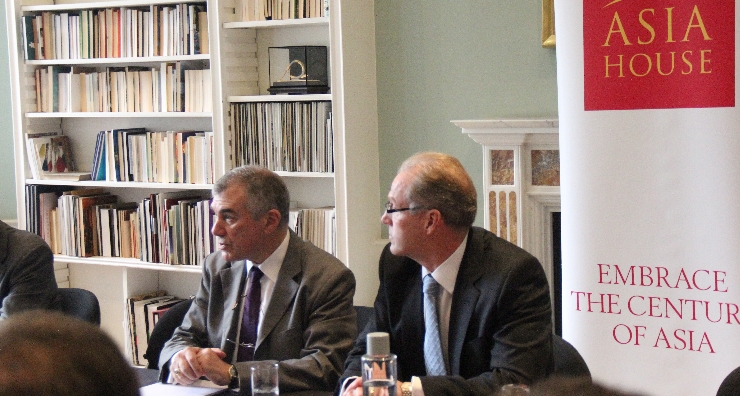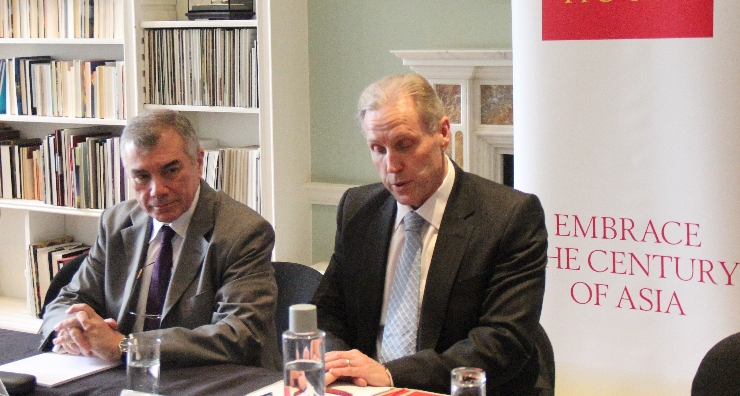Driving commercial and political engagement between Asia, the Middle East and Europe
Driving commercial and political engagement between Asia, the Middle East and Europe
Driving commercial and political engagement between Asia, the Middle East and Europe

Turkey wants to join the EU as soon as possible, it is committed to remaining as a secular republic, investment opportunities are rife and it is on drive to complete major infrastructure projects by 2023.
These were some of the comments by the Turkish Ambassador to the UK HE Ünal Çeviköz in an exclusive interview with Asia House.
He gave the interview following a private briefing with Corporate Members at Asia House, which was held under the Chatham House Rule.
Membership of the EU is very important to Turkey, Mr Çeviköz said. “We see the future of Turkey as being a full member of the EU,” he added, stating the EU was “probably the most successful peace project that has taken place in the last century.”
“It has brought peace to Europe and widened the concept of peace and stability all over the continent and that’s the reason why the EU enlargement policy has been appreciated and I think it has to continue and we want to be part of this important project because we are a European country,” Çeviköz added.
“Turkey has always been one of the major political powers in European history. Turkey should not be restricted to a distant geographical part of the continent. Turkey can help the EU become a more global player in the world,” he added.
But he said membership talks with the EU “had not been fair” as Turkey had met all the Copenhagen criteria but because of “certain political motives by certain countries” Turkey’s accession process had been blocked and the opening of certain chapters denied.
Turkey and the EU began accession talks on 35 negotiating chapters in 2005.
“France has been one of the countries blocking our membership. But after French President François Hollande was elected (in May 2012), France has lifted its veto on one of the chapters that were blocked so last year we could open Chapter 22 covering regional co-operation,” he said. “I think that now there is a process to open new chapters. The accession negotiations have been stalled for three years. The Greek Cypriots are blocking it too, creating difficulties in our accession negotiations. I think it is because the EU gave the possibility of being a member to the Greek Cypriots before resolving the Cyprus problem. Then after becoming a member they started to block our country’s accession,” he added.
If Turkey becomes a member of the EU, this will create new investment opportunities for the UK, he stated as British and Turkish business partners would be able to function in the EU and as the EU in third countries.
“We do not have any particular year in mind that we will join,” he said. “But 2014 is the priority year when Turkey plans to develop a more intense relationship with the EU.”
Twitter and YouTube were blocked in Turkey in the run-up to the local elections, following tweets alleging corruption among Turkish Prime Minister Recep Tayyip Erdoğan’s inner circle, and one audio recording (which the Turkey Government says is distorted) in which Turkish officials supposedly discuss military action in Syria.
Çeviköz said: “The bans on Twitter and YouTube were not permanent. They were temporary measures. They were imposed by the court decisions, not by the government and they were temporary and now there is a new court decision to lift this ban,” he said. “So things will probably go back to normal soon.”
He said the Government of Turkey tried to approach Twitter and YouTube to block certain accounts and videos after Turkish courts ordered them to remove content from their sites “but it was not possible to get a positive response from these two companies. It was done through a court process and it was a legal procedure in the courts that originally banned it,” he said.
He said the fact the Constitutional Court’s decision was being adhered to by the Government demonstrated that the rule of law prevailed.
Çeviköz did not comment on the content of the audio recording in which top Turkish officials allegedly discuss military action in Syria.
He said: “The goal of such recordings is to create confusion over Turkey’s Syria policy under the pretext of the said wiretappings. The general policy of Turkey is that we want to see an all inclusive government in Syria as soon as possible and we have made it very clear that a transnational government needs to be established.” He added: “I was encouraged by the constructive attitude of the opposition delegation during the Geneva II process and I hoped that there would be an agreement between the regime and opposition. But all of this remained in vain as the intransigency and unconstructive approach of the regime in Geneva prevented us from reaching an understanding.”
He pointed out that Syria was rapidly transforming into an area where terrorist organisations were posing many problems for Turkey, not least the fact that close to one million refugees had fled into Turkey.
“They are all hosted in some 22 camps down along the Turkish and Syrian border but those camps are only able to keep 220,000 and the rest are in different cities,” he said. “They are now being integrated into the social and economic life and this is becoming a major burden for Turkey so we would like the Syrian problem to be resolved through diplomatic and peaceful means.”
The camps, supported by the Turkish Government, have cost Turkey more than US $2.5 bn to date.
As for whether Turkey was funding the rebels in Syria, he said: “There are some allegations that some of the arms going to the rebels are going through Turkish territories. It’s not the official policy of the Turkish Government to arm any party in the Syrian conflict because we don’t believe in solving problems by means of weapons. Politically we support the opposition because they are asking for democratic rights. That’s how all these difficulties started three years ago because it was a reaction to the oppression of the totalitarian regime. That’s why we gave political support to the opposition but we are looking for a peaceful solution as the official Turkish Government policy does not support an armed struggle.”
Pro-Russian armed forces entered Crimea in February 2014 and seized control of strategic buildings after Viktor Yanukovych was ousted as Ukrainian president. This led to Crimea seceding from Ukraine following a controversial referendum and Russia then signed a treaty declaring Crimea as a federal subject of Russia.
An approximate 300,000 Tartar community, who are ethnically Turkic and Muslim, live in Crimea. Çeviköz said the Turkish Government was concerned about their future and wanted to see their identity recognised and their language and traditions respected.
“They do not want Crimea to be annexed by Russia and are rejecting the current situation,” he said.
The Crimean Tartars were deported from the former Soviet Union to Central Asia in 1944 but started to return to Crimea after 1991 after the fall of the former Soviet Union.
“We wish to resolve these difficulties by peaceful means and we are suggesting to both sides not to escalate and instead we are suggesting the Tartars talk to the Crimean administration to find a solution,” he explained.
He said Russia had offered recognition of the Tartar identity in Crimea after annexation. Turkish Prime Minister Erdoğan had also spoken to Putin and said Turkey wished to see tensions “eased.”

Turkish Ambassador to the UK HE Ünal Çeviköz with CEO of Asia House Michael Lawrence
Iran is an important trading partner but Turkey was abiding by UN sanctions against Iran, he stressed. However he pointed out there had been considerable progress by Iran on implementing the Joint Plan of Action, in which Iran would curb its nuclear programme. If the Iranian nuclear issue got resolved, Iran offered “enormous opportunities” to the EU, he said.
Turkish Prime Minister Recep Tayyip Erdoğan recently won a substantial victory in the countrywide local elections.
Çeviköz would not comment on whether Erdoğan was running in the August 2014 presidential elections, saying only: “No one has put in their candidacy for the presidential elections yet.”
As for allegations of fraud in the Turkish nationwide local elections, he said: “We have seen all this in the newspapers and there were some claims for a recount in certain parts of the country by both the Opposition and the Government parties. I think these kinds of allegations have to be substantiated and if there is some kind of concern about fraud, it would only be reasonably accepted if it had been noted by independent observers but I have not seen any complaints from an independent overseas mission.”
Responding to fears from some quarters that the country was moving in an Islamist direction under Erdogan’s leadership, Mr Çeviköz said 99 per cent of the population in Turkey were Muslim but confirmed Turkey would always remain secular as it was written in her constitution. “This aspect of the constitution will never be changed. Yes, there has been a growing appearance of certain religious issues being used as reference in social life in Turkey and not just in Turkey but in the West too. As long as they remain part of the social life and as long as religion does not intervene into public affairs and politics it is fine as secularism is guaranteed by the constitution,” he said.
“Turkey has never been a country that has been ruled by Islamic law because the tradition of the modern Republic of Turkey is to keep religious affairs separate from politics and public affairs. Politicians who have very strong religious feelings may wish to see the social life of the country make stronger reference to religion but it is always important to every politician that Turkey remains a secular republic.”
He seemed to think concerns from the West about the recent alcohol ban were misplaced. “The so called alcohol ban is not simply a ban on the consumption of alcohol, just a ban on the sales of alcohol at certain times of the day. A decision was taken to ban the sale of alcohol in shops late at night and close to mosques and schools. It does not affect restaurants and bars,” he said.
Turkey’s GDP grew at four per cent in 2013 and the Government is making huge investments in its financial sector, as well as energy, infrastructure, construction and telecoms sectors.
The urban renewal project, which began in 2012, which will see the demolition and reconstruction of approximately seven million residential buildings across Turkey, to make them earthquake-proof, together with a new airport in Istanbul, and major transport and telecoms projects, will be finished by 2023, the centenary of the formation of the Turkish republic, he said.
naomi.canton@asiahouse.co.uk
For more information on corporate membership of Asia House click here.
To read stories and opinion pieces on the Indian general election 2014 click here.
